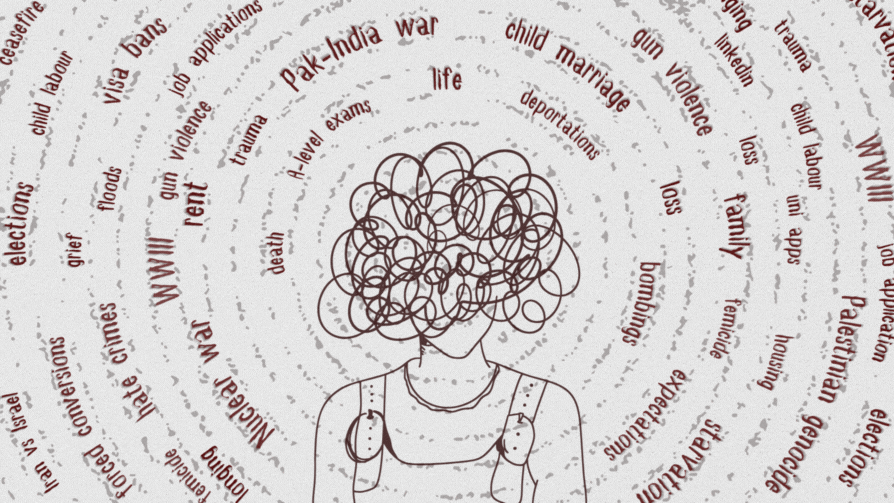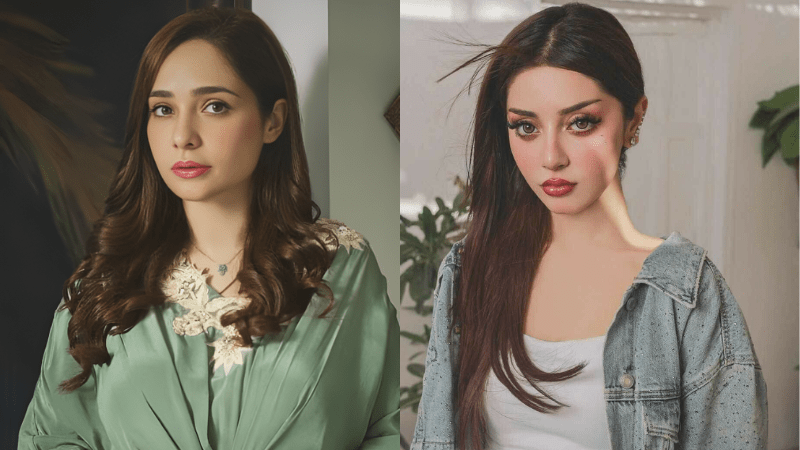Pari is predictable and that's its biggest downfall
Let me tell you: the trailer is deceiving.
I had zero expectations before going to watch Pari. None. For me, when it comes to horror films, more often than not, high expectations meet an uninspired script, amateurish acting and faulty CGI. The result is a major disappointment.
While the above is true for Pari, what the film really lacks is a comprehensible storyline.
Spoilers ahead
The film starts with a family of three moving into their new home in the middle of nowhere. The mother, Mahwish (played by Azekah Daniel), and her daughter Pari (played by Khushi Maheen), sense a weird presence in the house, but the father, Shahraam (played by Junaid Akhter) is unsuspecting.

The parents notice a change in Pari's behaviour and this concern soon gives rise to tension between the couple. They are repeatedly warned by a man from the woods (played by Saleem Miraj), who forebodes that their daughter will lead to their doom. However, they pay no heed to him, until things take a turn for the worse.
Pari is a haphazard collection of scenes and characters put together
The film unsuccessfully tries to weave together a story with no coherence or connection and ends up leaving the audience perplexed.
The audience is set up to believe that the girl Pari is the focus, however, less than halfway into the film, the story changes course and becomes about the father, with some focus on the mother and Pari disappears in the background till needed.

The choppy editing paired with an introduction to new faces in the story do little to help the plot. In one scene, Pari is shown walking in the middle of the woods towards a large tree performing some strange ritual. The scene abruptly switches to the man in the woods twirling around with visions of Pari. Who is this man? Where did he come from? What is his purpose in the film? We don't know.
The story of this man is only revealed in the last ten minutes of the film, when we find out that he was a doctor who used to live in the house prior to the family of three and now his dead son haunts the house. There is still a lack of connect between the family, this man and his son. We never find out what the purpose of this man truly is.

What's also confusing is the number of ghosts and their motive in the film. The first half features a ghost of the little boy haunting Pari, but towards the second half we see another ghost make an appearance, this time it's a nun haunting Mahwish. The boy also disappears after the first half and reappears towards the end. His purpose in the film is unestablished; he's just a spirit lurking in the house. The nun's objective is also unclear.
Overall Pari borrows too many elements from various horror films without providing an explanation or justification for those components and loses the plot.
Pari does what most scary films do: recycle textbook horror story plug-ins, making it predictable
Doors creaking, swinging shut. Dead crows. Rocking chair. Candle blowing out. Sudden ghost appearances. Lights going out. Crazy person who is ultimately the deliverer. And you can guess the rest.
Pari mainly fails to deliver because it hinges on to the same humdrum checklist every horror film employs; resulting in a film severely lacking originality, imagination and being disappointingly predictable.

Perhaps what made the experience worse was that the above are used ad nauseam, till everyone in the audience was begging for the doors to stop slamming shut.
The story of a family moving to a new house triggers the first yawn. Minutes into the film Pari witnesses a door banging in front of her and the bathroom door knob turning aggressively. Cue second yawn. The door flinging continues scene after scene; when Shahraam is working on his laptop late at night; when Mahwish goes to her bedroom; when the professor - who comes to visit the family - makes his way to one of the rooms during lights out.

In another scene, Mahwish is shown praying at nighttime, a rocking chair strategically placed beside her prayer mat... we all know the purpose of an empty rocking chair. It did what it was supposed to do. It started rocking. Third yawn.
Here's the problem with predictability, it kills the suspense and the film ends up giving you the laughs instead.
Pari has its fair share of disturbing tropes which raise a number of concerns
Filmmaking comes with great responsibility, one which Pari reels away from multiple times during the course of the two hours. Like:
1) A romantic relationship between a teacher and student
A flashback of Shahraam and Mahwish's first interaction reveals that the two shared a student-teacher relationship which snowballed into an intimate affair in and outside of university, eventually leading to marriage. The film fails to recognise that this act between the two is a crime especially when a minor is involved, it can fall under sexual harassment and possibly land the teacher behind bars.
Furthermore, showing and promoting such a relationship dynamic can heavily influence minors and pave the way for ideas creating a grey area between what's acceptable and unacceptable in the professional world.
2) The (mis)representation of women through the main female lead, Mahwish
The lack of attention given to the female leads in the film is troubling, but what's more worrisome is the treatment of the only woman, Mahwish, at the hands of the men she interacts with.
Mahwish is shown as careless, irresponsible, irrational, irritable and moody, while her male counterpart Shahraam is the calm, cool, collected one in the relationship. Though this could be owing to the age gap between the two and difference in maturity level (see point above), I find it rather reckless that her role is reduced to one of being puerile.

Mahwish runs away from confrontations, is strangely distant from her daughter, cries when she can't bring herself to say anything, and is hysterical when upset. Shahraam, is the glue keeping the family together trying to solve all their problems.
Their relationships goes downhill when Shahraam demands to know whose child Pari is, immediately second-guessing his wife. He yells while she looks at him helplessly while he continues to shout.
The film never fully grants Mahwish the opportunity to speak, giving Shahraam the upperhand. His lines to Mahwish like, "Everything is going according to the way you want it," and "You know I can never get mad at you," automatically place sympathy in the hands of the husband, irrespective of his treatment towards Mahwish.

She only manages to get one scene to herself, and that not even: when she's on the balcony with Shahraam. He mentions her odd behaviour since they moved and grabs her arm when she tries to walk away, demanding an answer. She lets off steam and calls him out for never listening to her. His response to Mahwish's outburst is, "Would you like some water?" which only trivialises her suffering.
Their relationship can be summed up by calling Mahwish the problem and Shahraam the saviour. Mahwish brings about the demon child, finds no solution to it and attempts suicide, Shahraam manages to find the solution, kills the demon and ultimately saves Mahwish.
3) Provoking a science vs religion conflict, only to get preachy
It's never a good idea to get into the science vs religion debate, especially when there is a significant lack of healthy discourse, but Pari goes ahead and argues anyway. Shahraam being the non-believer represents science and Mahwish (for the most part) - along with mufti sahab and the man from the woods - represent religion.
Shahraam gets shade for being a non-believer throughout the film; by his wife when they argue on the balcony. "I told you I wanted to get Quran khani done in this house but you refused calling it nonsense," Mahwish complains.

His favourite professor who he speaks highly of also taunts Shahraam's non-Muslim ways whenever possible. For instance, when the professor's interactions with Pari do not go as pleasantly as he'd hoped, he is quick to throw shade at the father by saying, "Yeh toh is hi ki beti ho sakhti hai" (she is surely Shahraam's daughter) - suggesting that Pari's unfriendly demeanour stems due to the father's lack of belief.
The ending gets even more absurd as Shahraam encounters the mufti sahab who plays the role of the oracle in the film. He says, "We all came from the earth and to earth we must return." His solution to Shahraam's problems is guised in a question: Did you offer prayers?

Spoiler alert
Taking cue from the mufti sahab, Shahraam unsuccessfully sets out to bury his daughter aka the devil... alive, when in the nick of time mufti sahab's question hits him and he immediately stands up in prayer, causing the devil's demise.
This kind of preachy narrative only serves to add to people's religious beliefs but in a negative way; they will leave theatres with reinforced fanatical beliefs without being provided an adequate debate on the topic. In other words, there needs to be a level playing field when contesting between science and religion.
★ ☆ ☆ ☆ ☆
Verdict: A far cry from being scary, Pari drags on mindlessly and leaves the audience with a senseless plot and excessive close-up shots which do less to create impact and only accentuate the poor makeup job.
Given that in our society we so strongly believe in jinns and the other worldly, Pari could've easily cashed in on our culture's obsession with the supernatural. Unfortunately, the film is a missed opportunity.










Comments